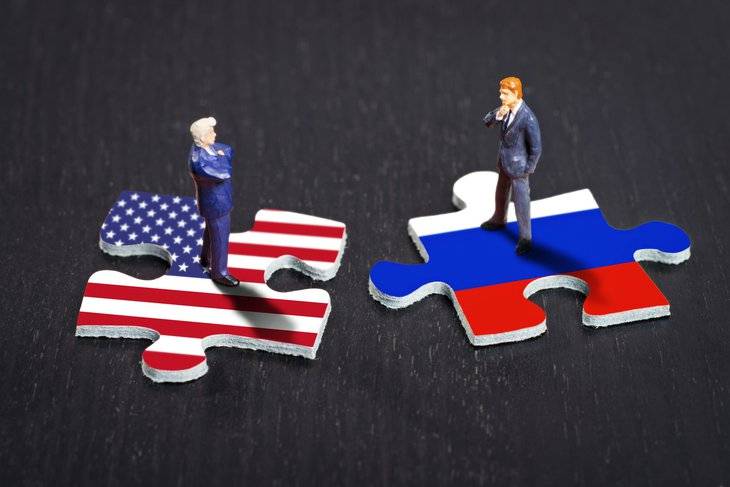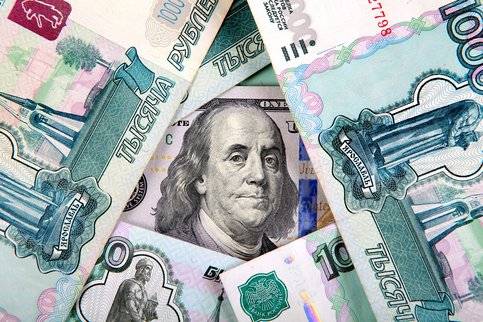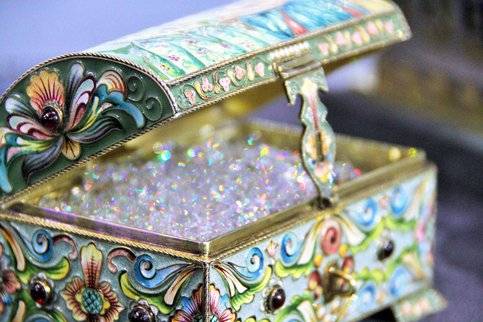America offered to buy Russia

The author of the article states that Russia and the Western world are approaching the beginning of a new cold war, so there is a heated debate in the US about how to contain Russia. The emphasis on military deterrence, which today is given priority, is too expensive: only in 2017, US military spending will amount to 589 billion dollars.
"We should pause for a minute and ask ourselves: why should the West deplete its resources if Russia is not ruled by Stalin - or Hitler-like leaders obsessed with world-dominated ideologies - but rather a group of entrepreneurs who keep their money in Western banks, they buy real estate in the West, teach their children in Western universities and have passports and even temporary residence permits, ”writes The American Interest.
“These people would not rule Russia as they do now if they really wanted to rule the world,” the author stresses. According to him, the Russian elite only seeks to "gain material advantage from the ownership of the corporation called" Russia ".
On this basis, an obvious solution to the problems hanging over the West concerning Russia is coming to the fore. “If Russia behaves not so much as a rationally organized modern state, but rather as a" corporate "country, which is owned by local oligarchs, then its behavior should be viewed not as a state, but as an intercorporation,” the magazine notes. “And in the corporate world, the best possible The steps that should be taken in relation to a small but aggressive company are an attempt to buy it and incorporate it into a larger business conglomerate. "
“These people would not rule Russia as they do now if they really wanted to rule in peace”
The author of the article emphasizes that this, of course, is about the purchase not of territory, natural wealth or people, but of assets that the Russian ruling class considers its property. Accordingly, it is proposed to take the value of all Russian companies whose shares are traded on the Moscow Exchange as a basis for calculating the price of such a transaction.
"On 1 August 2017, it was 33,6 trillion rubles, or about 559 billion dollars, that is, about the same as Alphabet or Microsoft," - says The American Interest. Of course, there are still private assets, as well as revenues received from state unitary corporations, therefore it is reasonable to increase the indicated figure by one and a half to two times. “But even if we double the figure mentioned above, we’ll get a total of 1,1-1,2 trillion dollars,” the magazine reassures readers.

In addition, a significant part of Russian assets already belongs to foreign investors, so that part of the amount can be saved. “So let's stop at 1 trillion dollars,” suggests The American Interest.
“Until now, the assets controlled by the Russian elite had a positive profit in the amount of 10-12% of their market value - or approximately 65-85 billion dollars annually,” the author of the article calculated. “This figure practically coincides with the outflow of net capital from Russia: according to the Bank of Russia, from 2008 to 2016 year, capital outflows in total amounted to 644,7 billion dollars. "
From the coincidence of figures, the author concludes that "company owners are trying to extract the maximum profit from Russia." The conclusion suggests itself. “What happens if all these people offer a“ fair ”price for their property - for example, 2 trillion dollars, which is 30 times their annual net income? Will these people bargain hard if a serious buyer offers them a good price? ".
According to the American magazine, the Russian oligarchs will be happy to seize such an opportunity, since "the overwhelming majority of the representatives of the Russian elite are prepared for losing all their assets."
A significant part of the article, of course, is devoted to a discussion of the question of whether the indicated price is too large. “2 trillion dollars is less than half of that amount (4,79 trillion dollars) that the US has already spent on a senseless war in Iraq,” the author explains. “These are about two US military budgets (in 2017 / 18 in the fiscal year, the US military budget will be 824,7 billion dollars.) 2 trillion is one-tenth of the US federal debt or the amount by which this debt increases every two years. "
You can also add that in the framework of the "quantitative easing" program, the US Fed has distributed 3,5 banks trillions of dollars. "2 trillion can hardly be called a high price for eliminating the greatest existential threat looming over the US," concludes The American Interest.
"In addition, we should not think of these 2 trillion dollars as money to spend and forget," explains the American magazine. "Buying Russia will be the best investment the US government has ever made. Russian companies are seriously undervalued and only a small part of the value of their American counterparts. If a more responsible leadership and a more transparent judicial system appear in Russia, these assets will grow at least five times in value. "
"At the same time, Western companies will get a huge new market, huge reserves of resources and talent"
The author of the idea provided that "prior to the conclusion of this transaction, all representatives of Russia will receive immunity from prosecution for financial crimes, that all money held in conditional deposit accounts will be exempt from any checks and that participants in the transaction selling assets worth more than 20 million dollars, will receive passports of western countries or permits for permanent residence. " Thus, the money that the West spends on this transaction will remain within Western economies and will be reinvested in real estate, stocks and other assets in developed countries. "At the same time, Western companies will receive a huge new market, huge reserves of resources and talents," writes The American Interest.

“Someone may say that this project is too unrealistic, because politics and business must be connected in it,” the author of the idea writes. “I can agree with this, however, perhaps we should still try to implement it, because the policy and business is closely intertwined in the figure of a man who now holds the post of head of the White House. "
It remains to note the last detail - who is such a creative spawned such a brilliant idea. The author of the article in The American Interest is a Russian economist, sociologist and political figure Vladislav Inozemtsev.
Inozemtsev is a member of the Scientific Council of the Russian International Affairs Council (INF), established in 2011 by order of President Dmitry Medvedev. The list of co-founders of the INF Treaty includes the Russian Foreign Ministry and the Russian Union of Industrialists and Entrepreneurs. Official media calls this organization "one of the instruments of public diplomacy and the" soft power "of Russia in the world."
Information